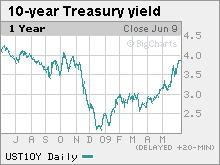10-year Treasury yield hits 4%
Government debt prices tumble as $19 billion of reopened 10-year notes comes to auction and Russia says it will sell some of its holdings.
NEW YORK (CNNMoney.com) -- Treasury yields soared - with the benchmark 10-year yield briefly touching 4% - after the government sold $19 billion of 10-year notes and Russia said it would reduce its share of U.S. debt.
The government has been selling large amounts of debt to fund various stimulus programs aimed at boosting the economy. On Wednesday, $19 billion in a reopened 10-year hit the auction block. Would-be buyers bid nearly $50 billion for the debt for a bid-to-cover ratio of 2.62.
That was enough to send the 10-year yield soaring to its highest level since Oct. 15, 2008. Bond prices and yields move in opposite direction.
Yields for longer-term Treasurys have been flirting with seven- and eight-month highs in recent weeks as investors become hesitant to park their money in traditional "safe havens" for longer periods of time amid a rising threat of inflation.
However, demand for shorter-term debt remains relatively healthy.
"It is one thing for people to say that they are willing to buy a 2-year at 1.35% -- that is a relatively low-risk trade," said Brian Edmonds, head of interest rate trading at Cantor Fitzgerald. "But to invest your money in U.S. government bonds for 30 years, you have a lot more risk."
By midday, the benchmark 10-year note had dropped 27/32 to 93-6/32, with its yield rising to 3.97% from 3.86% late Tuesday. The yield last settled above 4% on Oct. 31, 2008.
The 30-year bond sank 2 points to 91-16/32, and its yield jumped to 4.79% from 4.65%. Earlier in the session, the yield on the longbond reached as high as 4.83%. The last time the 30-year bond settled this high was over a year ago on Oct. 16, 2007, when the yield ended the session at 4.9%.
The 2-year note dipped 3/32 to 99-2/32, and its yield rose to 1.36%. The yield on the 3-month note held steady at 0.18%.
Debt sales: Debt prices have fallen under the weight of supply. As prices have fallen, however, yields have shot higher, boosting home mortgage rates with them.
In an effort to combat rising mortgage rates, the government is buying back $300 billion in debt, a program called quantitative easing. The Federal Reserve purchased $3.5 billion of debt Wednesday that matures between August 2019.
The program has struggled to keep a lid on long-term lending rates. But "the government would argue that we would be even higher yields if they didn't do the purchase program," said Edmonds.
Russia retreats: Also weighing on Treasury prices Wednesday was Russia's announcement that it will reduce the share of U.S. debt in its forex reserve holdings, according to Reuters.
About 30% of its $404 billion in reserves are held in Treasurys, Reuters reported. A Russian official said the Treasurys were purchased as a safe haven during the height of the international banking crisis, and will be sold in order to purchase International Monetary Fund bonds and investments in commercial bank deposits.
"I think you are seeing an international bit of a crisis in terms of confidence in the U.S. and a lot of it centers around policies that are highly inflationary," said Edmonds. The surge in long-term Treasury yields is evidence that some foreign countries do not trust that the U.S. deficit spending program is sustainable.
The U.S. has "created an inflationary monster" with its multi-pronged bailout and other countries are raising the red flag, said Edmonds. "They are screaming get your fiscal house in order."
Lending rates: One key bank-to-bank rate moved lower. The 3-month Libor edged to 0.64% from 0.65%, according to Bloomberg.com.
The overnight Libor rate ticked down to 0.26% from to 0.27% the day prior.
Libor, the London Interbank Offered Rate, is a daily average of rates that 16 different banks charge each other to lend money. The closely-watched benchmark is used to calculate adjustable-rate mortgages. More than $350 trillion in assets are tied to Libor.
Has the recession actually helped you? From lower debt payments to cheaper home prices, many people have benefited from the current downturn. If you've made out financially and want to share your story, please e-mail mailto:stevehargreaves@turner.com. For the CNNMoney.com Comment Policy, click here. ![]()


